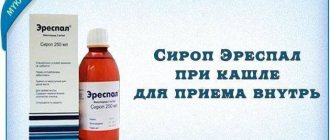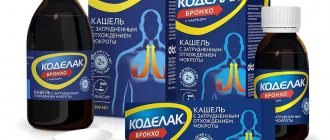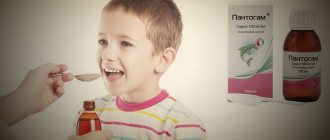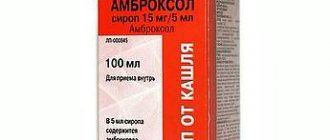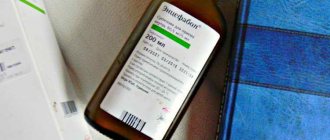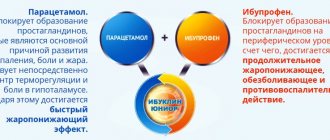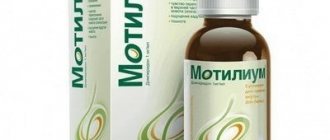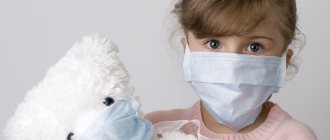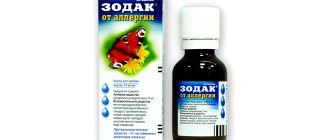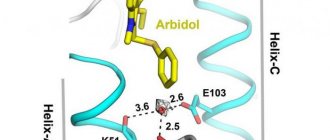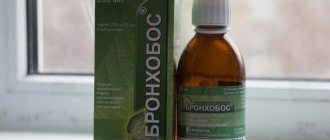Compound
One tablet of the drug Omnitus contains 20 or 50 mg of butamirate citrate and such inactive excipients as: lactose monohydrate, hypromellose, magnesium stearate, talc, colloidal anhydrous silicon dioxide, povidone.
The composition of the film shell includes: ethylcellulose, hypromellose, talc, macrogol, titanium dioxide and yellow dye E110 “Sunset”. 1 ml of syrup contains 0.8 mg of butamirate citrate and auxiliary inactive substances: non-crystallizing sorbitol 70%, glycerol , sodium saccharinate, benzoic acid, anise oil, vanillin, ethanol 96% sodium hydroxide and distilled water.
Release form
Omnitus is available in modified-release film-coated tablets with a dosage of the active substance of 20 or 50 mg, yellow or orange in color, round biconvex shape, and also in the form of syrup.
- The tablets are packaged in PVC or aluminum blisters of 10 pieces, there is 1 blister in a cardboard box, while the syrup is sold in 200 ml bottles made of dark glass, sealed with a plastic cap and tamper evident.
- The syrup is supplied with a 5 ml measuring spoon with a 2.5 ml line. One cardboard box contains 1 bottle.
Pharmacological properties
Pharmacodynamics
Butamirate citrate, the active ingredient in Omnitus, has a direct effect on the cough center, improves spirometry and blood oxygenation.
The substance is not related to opium alkaloids either pharmacologically or chemically.
Pharmacokinetics
Butamirate citrate is characterized by high absorption. After taking a tablet at a dose of 50 mg, the maximum concentration (Cmax) in the plasma of the main metabolite is observed after 9 hours and is 1.4 μg/ml; after taking syrup at a dose of 150 mg, Cmax is observed after 1.5 hours and is 6.4 μg/ml. ml. Does not have a cumulative effect.
Butamirate citrate is rapidly hydrolyzed in plasma to diethylaminoethoxyethanol and 2-phenylbutyric acid. Both metabolites also have antitussive effects. They are characterized by high binding to plasma proteins, due to which they remain in the plasma for a long time. 2-phenylbutyric acid, the main metabolite, is further oxidized to 14C-p-hydroxy-2-phenylbutyric acid. All these metabolites are excreted through the kidneys. Acidic metabolites are associated mainly with glucuronic acid.
Pharmacodynamics and pharmacokinetics
Omnitus is a centrally acting antitussive drug. The active substance has no chemical or pharmacological similarity to opiates and acts directly on the cough center , which has an expectorant, moderate bronchodilator and anti-inflammatory effect, improves spirometry (external respiration tests) and blood oxygenation .
Pharmacokinetics
- Absorption : absorption is high. Taking 150 mg of syrup can cause a maximum plasma concentration of the main metabolite - 2-phenylbutyric acid - 6.4 μg/ml after 90 minutes, 50 mg tablets - after 9 hours - 1.4 μg/ml.
- Metabolism : hydrolyzed in plasma to 2-phenylbutyric acid and diethylaminoethoxy-ethanol . Next they bind to plasma proteins , then the main metabolite undergoes oxidation. The drug does not accumulate in the body.
- The half-life of butamirate citrate when taking syrup is 6 hours, when taking 50 mg tablets - 13 hours. Excretion occurs through the kidneys. Acidic metabolites are eliminated primarily as glucuronides .
Indications for use
The medicine Omnitus is a centrally acting antitussive drug. It suppresses the cough center, which is located in the medulla oblongata, and as a result the cough goes away. In addition, the medication expands the bronchi, suppresses the inflammatory process, improves lung function, and promotes oxygen saturation of tissues.
The medication is recommended for children who have a dry, non-productive cough of various origins, including those arising from whooping cough, influenza and other diseases.
It is also used to suppress cough before, during and after surgery, and for diagnostic studies of the bronchopulmonary system, such as bronchoscopy - examination of the bronchial tree using a special medical instrument.
Important information! An antitussive should not be given to children with a wet or, as it is also called, a productive cough, when phlegm forms in the bronchi. When the cough reflex is suppressed, it will stagnate in the respiratory tract and serve as a good environment for the proliferation of pathogenic microflora, which can lead to the development of pneumonia. For diseases of the bronchopulmonary system, which are accompanied by a wet cough with difficult to separate sputum, you need to drink expectorants and mucolytics, such as Ambrobene, Lazolvan, ACC.
Instructions for use of Omnitus (Method and dosage)
The drug must be taken orally, without chewing, before meals.
According to the instructions for use of Omnitus tablets , their use depends on the age of the patient:
- 20 mg – adults should take 2 tablets. 2 or 3 times a day, patients aged 6-12 years are prescribed 1 tablet. twice a day, from 12 years old, 1 tablet three times a day;
- 50 mg - adults are recommended to take 1 tablet every 8-12 hours.
Instructions for use of Omnitus syrup suggest using a 5 ml measuring spoon. The dosage is different for different age categories:
- adults and elderly people - 30 ml (corresponds to 6 measuring spoons) 3 times during the day;
- from 9 years (child weight 40 kg) - 15 ml (corresponds to 3 measuring spoons) 4 times during the day;
- 6-9 years (weight 22–30 kg) - 15 ml (corresponds to 3 measuring spoons) 3 times during the day;
- 3-6 years (weight 15-22 kg) - 10 ml (corresponds to 2 measuring spoons) 3 times during the day.
Omnitus or Sinecode: which is more effective?
Sinekod contains butamirate as its main component. It is produced not only in syrup, which is approved for children over 3 years of age, but also in drops, which are suitable for babies over 2 months old. In addition, it differs from Omnitus in terms of shelf life, storage conditions, and price. Sinekod does not lose its properties for 3 years from the date of production. The drug should be stored, regardless of the form of release, in a damp place, protected from light at temperatures up to 30 degrees. Sinekod costs more. Otherwise, both antitussives are similar, and after consultation with a pediatrician, you can take any of these medications.
special instructions
A standard single dose of 10 ml syrup contains 0.03 ml of ethanol, which should be taken into account when prescribing the drug to patients with liver or brain diseases, alcoholism , epilepsy , since treatment may pose a health hazard.
When treating with Omnitus, you should not prescribe drugs that can depress the central nervous system, for example: tranquilizers , sleeping pills , antipsychotics . In addition, patients should refrain from drinking alcohol.
Reviews
Moms and dads opinion
Parents leave positive and negative reviews about Omnitus baby syrup. Among the advantages they note the following:
- The drug helps well with dry cough, it becomes less frequent.
- The medicine tastes sweet and has a pleasant smell, so most children drink the syrup well.
- To open the syrup, you first need to press the lid, then turn it counterclockwise, which is not possible for a small child to do. This reduces the likelihood of an overdose if the baby finds the medicine and wants to take it himself.
Negative reviews are due to the fact that the child may be allergic to Omnitus. Some parents write that the syrup is ineffective; they give it for a dry cough in order for it to become moist and end. Preparations based on butamirate cannot be used because they cause mucus to appear in the respiratory tract. They suppress the cough reflex, and in order for a cough to change from dry to wet, you need to take medications from a different group: mucolytics and expectorants.
Opinion of Evgeny Komarovsky
Evgeniy Olegovich takes the antitussive medicine well. But he believes that the only time you can drink it is a dry cough, which is observed against the background of whooping cough. In other cases, taking it can be dangerous. Due to treatment, the cough reflex is suppressed, and phlegm will accumulate in the respiratory tract, which can lead to inflammation of the bronchi or lungs.
A well-known pediatrician urges parents not to self-medicate. If a cough appears, Evgeniy Olegovich recommends contacting a doctor who will examine the child, listen to him and, if necessary, prescribe an antitussive drug.
Although the syrup can be purchased without a prescription, it should not be given to a child without consulting a pediatrician. Only a specialist, after examining the patient, can decide on the advisability of treatment with this drug and tell how to take Omnitus.
By
Reviews about Omnitus
Numerous reviews of Omnitus tablets as an antitussive drug indicate the effectiveness, demand and availability of this product. However, many use it in combination and note some negative aspects, expressing themselves as follows: “It helps, I stopped drinking - the cough appeared again,” “Why are dyes needed in medicines? They only cause harm."
Reviews about the syrup are positive; many people like its pleasant smell and taste, the possibility of using it for children, and its affordable price.
Is Codelac Neo for a child or Omnitus better?
Codelac Neo has the same active substance, similar indications, contraindications and adverse reactions. This is a Russian drug that is commercially available in drops, syrup and tablets. It differs from Omnitus in the composition of auxiliary products and shelf life (for Codelac Neo it is 36 months). For dry cough, babies over 2 months of age should take Codelac Neo drops. Children older than this age can be treated with Omnitus or Codelac Neo in syrup.
Omnitus price, where to buy
On average, the price of Omnitus syrup is 145-170 rubles.
Tablets with a dosage of 20 mg cost 120-260 rubles (10 tablets per package), while 50 mg costs 230-250 rubles (10 tablets).
- Online pharmacies in RussiaRussia
ZdravCity
- Omnitus tablets 50 mg 10 pcs. Hemofarm A.D.
RUB 237 order - Omnitus syrup 0.8 mg/ml 200 ml Hemofarm A.D.
RUB 224 order
Adverse reactions
Omnitus syrup is usually well tolerated by children, but sometimes it can provoke a number of undesirable reactions. During treatment the following may occur:
- dizziness;
- allergy;
- rashes;
- loose stools;
- drowsiness;
- nausea.
If the listed reactions occur during therapy or undesirable effects not described in the instructions occur, you should consult your pediatrician; he may cancel the syrup or replace it with another.

